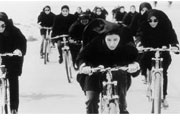AN OLD WOMAN on a shopping spree, a young wife in a bicycle race, a 9-year-old girl playing on the beach—they’d have nothing in common were it not for the unifying conceit of this remarkable three-part Iranian drama. It’s written by one of that country’s foremost directors, Mohsen Makhmalbaf, whose The Silence played here last March, and directed by his wife, Marziyeh Meshkini. (Continuing the impressive family dynasty, his daughter Samira—from his prior marriage to Meshkini’s deceased sister—is also a director.)
THE DAY I BECAME A WOMAN
directed by Marziyeh Meshkini with Fatemeh Cheragh Akhtar, Shabnam Toloui, and Azizeh Seddighi runs April 6-19 at Uptown
As with much postrevolutionary Iranian cinema, Woman both flouts and incorporates old movie conventions. Its first episode resembles an Italian neorealist tale. “Please let me play a little,” the girl (Fatemeh Cheragh Akhtar) begs her mother and grandmother, who are measuring her up for a chador. Since she’ll turn 9 in an hour, she’s permitted 60 minutes of liberty with her best friend (a boy) before being cloistered for the duration of her life. Surrounded by green water and white sand, she’s briefly able to share a lollipop with her buddy—trading licks in a way that suggests precocious and soon-to-be-forbidden sensuality.
The second chapter is strongest, a nightmarish episode in which a young wife (Shabnam Toloui) pedals frantically with other black-scarved women while her angry husband pursues her on horseback. The terrifying thudding of hooves represents history and patriarchy, while her silent gears hint at modernity and possible escape. Again and again she accelerates as more male emissaries of her clan reproach her. A mullah shouts, “What you are riding is not a bicycle—it is the Devil’s mount!” Throughout, Meshkini keeps her camera moving with the actors; there’s not a single static shot, furthering the sense of breathless tension.
Lastly, we meet an old woman (Azizeh Seddighi) with fingers bouqueted with colorful knots of yarn; each strand reminds her of a long-desired item she purchases at a Western-style mall. Finally, one red bow remains. What does it stand for? she wonders. What has she forgotten? When she spreads her trove on the beach for examination, setting up the living room, bedroom, and kitchen (with magically working appliances), the tableau recalls Fellini. Other characters reappear, and with them the distinct phases of a woman’s life become simultaneous. Time collapses upon itself; identities converge.
It’d be too blunt to say that Woman is a mere feminist critique of Islamic society; Meshkini and Makhmalbaf are too cagey to provoke censorship (which he’s suffered in the past). Indeed, it’s not an overwhelmingly sad or tragic film; there are many moments of absurdist humor. In its willfully opaque conclusion, Woman somehow conveys both optimism and pessimism. The ocean suggests vast freedoms denied women, while the narrow shore still provides precious room for exploration.








